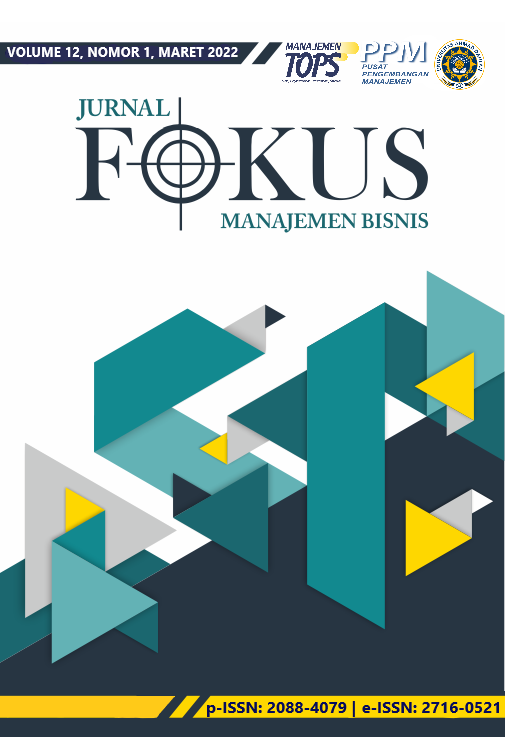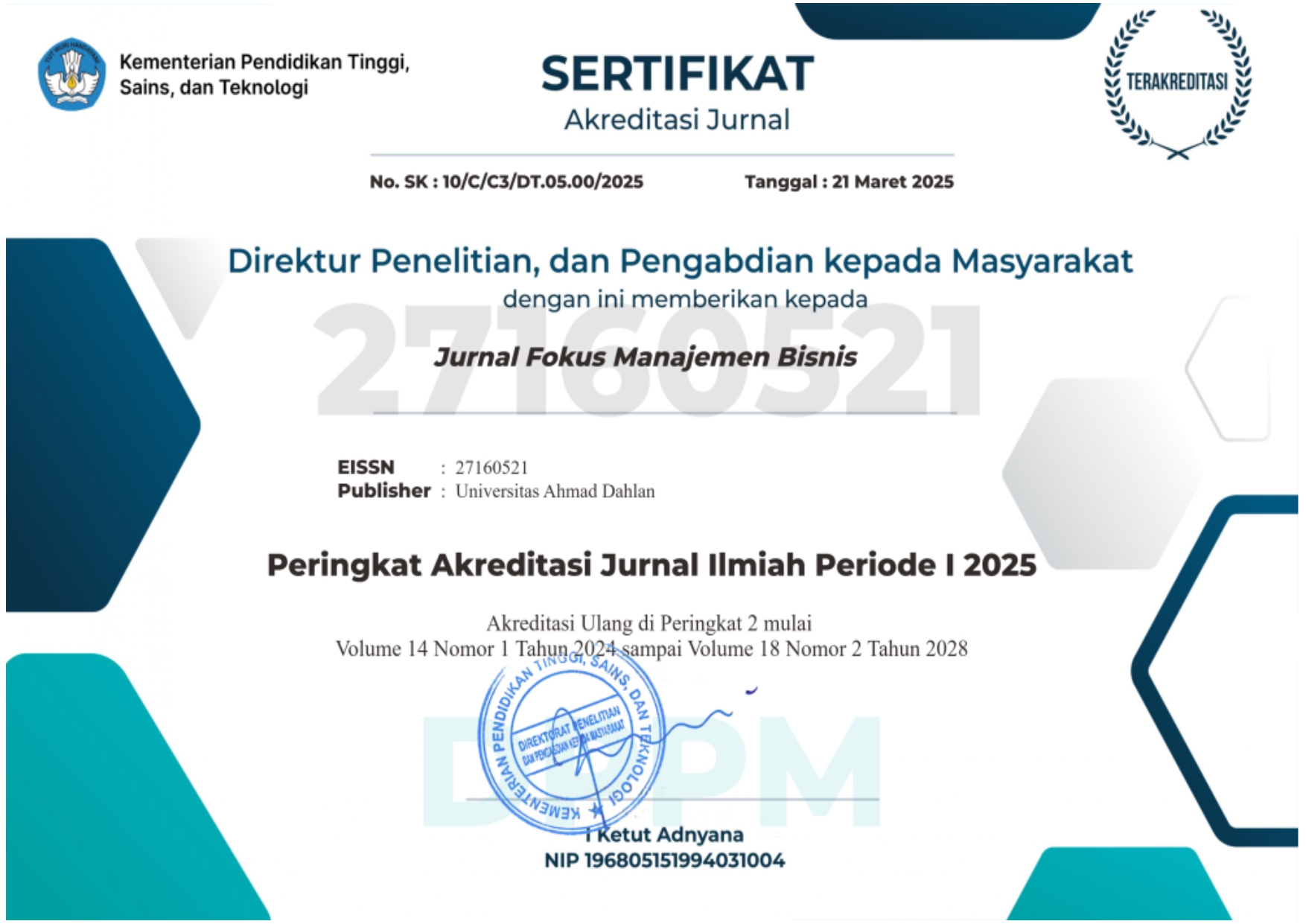PENGARUH PERSEPSI RISIKO DAN DUKUNGAN PEMERINTAH TERHADAP MINAT PENGGUNAAN MOBILE BANKING: PERAN PEMEDIASI PERSEPSI KEGUNAAN
DOI:
https://doi.org/10.12928/fokus.v12i1.5987Abstract
The Covid-19 pandemic has influenced the government to implement various policies as a form of support to break the chain of the spread of the Covid-19 virus. In addition, the presence of the Covid-19 pandemic requires people to switch from cash transactions to non-cash transactions to prevent exposure to the Covid-19 virus. Technological developments support this transition with the presence of mobile banking to facilitate non-cash transactions. This study aims to determine the effect of perceived risk and government support on interest in using mobile banking with perceived usefulness as a mediating variable. This type of research is quantitative research and uses a questionnaire to obtain data which is then processed using Structural Equation Modeling-Partial Least Square (SEM-PLS) software. The results of the study prove that risk perception has the most influence on interest in using mobile banking, while government support does not influence the use of mobile banking.
References
Ahmad, M. (2018). Review Of The Technology Acceptance Model (TAM) In Internet Banking And Mobile Banking. International Journal of Information Communication Technology and Digital Convergence, 3(1), 23–41. http://www.kasdba.org/ijictdc/documents/vol3no1/05. Review of The Technology Acceptance Model (TAM) in Internet banking and Mobile banking.pdf
Aji, H. M., Berakon, I., & Md Husin, M. (2020). COVID-19 And E-Wallet Usage Intention: A Multigroup Analysis Between Indonesia And Malaysia. Cogent Business and Management, 7(1). https://doi.org/10.1080/23311975.2020.1804181
Al-Haderi, S. (2014). The Influences of Government Support in Accepting the Information Technology in Public Organization Culture. International Journal of Business and Social Science, 5(5).
Alfaini, A. U. H., Wulandari, U. F., & Nadlir, N. (2021). Implementasi Sistem Informasi Manajemen Guna Meningkatkan Kinerja Sekolah Pada Masa Pandemi Covid-19 di SMAN 1 Gondang Mojokerto. Al-Idarah: Jurnal Kependidikan Islam, 11(2), 202–214. http://103.88.229.8/index.php/idaroh/article/view/9805
Chitungo, S., & Munongo, S. (2013). Extending the Technology Acceptance Model to Mobile Banking Adoption in Rural Zimbabwe. Journal of Business Administration and Education, 3(1).
Davis, F. D., Bagozzi, R. P., & Warshaw, P. R. (1989). User Acceptance of Computer Technology: A Comparison of Two Theoretical Models. Management Science, 35(8). https://doi.org/10.1287/mnsc.35.8.982
Fadhli, M., & Fachruddin, R. (2016). Pengaruh Persepsi Nasabah Atas Risiko, Kepercayaan, Manfaat, Dan Kemudahan Penggunaan Terhadap Penggunaan Internet Banking (Studi Empiris pada Nasabah Bank Umum di Kota Banda Aceh). Jurnal Ilmiah Mahasiswa Ekonomi Akuntansi, 1Fadhli, M(2).
Ghozali, I. (2018). Aplikasi Analisis Multivariate dengan Program IBM SPSS 25. Edisi 9. Badan Penerbit Universitas Diponegoro.
Hair, J. F., Hult, G. T. M., Ringle, C. M., & Sarstedt, M. (2017). A Primer on Partial Least Squares Structural Equation Modeling (PLS-SEM). Sage, 165.
Herdiana, D. (2020). Social Distancing : Indonesian Policy Response to the Corona Virus. Jurnal Ilmu Administrasi, 17(1).
Hidayatullah, S., Waris, A., Devianti, R. C., Sari, S. R., Wibowo, I. A., & PW, P. M. (2018). Perilaku Generasi Milenial dalam Menggunakan Aplikasi Go-Food. Jurnal Manajemen Dan Kewirausahaan, 6(2), 240–249. https://doi.org/10.26905/jmdk.v6i2.2560
Humairoh, H., Negara, A. K., & Immawati, S. A. (2020). Pertimbangan dan Sikap Milenial terhadap Minat Menggunakan E-Wallet: Pada Masa PSBB Pandemi Covid-19 di Kota Tangerang. Organum: Jurnal Saintifik Manajemen Dan Akuntansi, 3(2). https://doi.org/10.35138/organum.v3i2.104
Isrososiawan, S., Hurriyati, R., & Dirgantari, P. D. (2019). User Mobile Payment Behavior Using Technology Acceptance Model (TAM): Study of “Dana” E-Wallet Users. Jurnal Minds: Manajemen Ide Dan Inspirasi, 6(2). https://doi.org/10.24252/minds.v6i2.11274
Kasemin, H. K. (2016). Agresi Perkembangan Teknologi Informasi. Prenada Media.
Lafraxo, Y., Hadri, F., Amhal, H., & Rossafi, A. (2018). The Effect Of Trust, Perceived Risk And Security On The Adoption Of Mobile Banking In Morocco. ICEIS 2018 - Proceedings of the 20th International Conference on Enterprise Information Systems, 2. https://doi.org/10.5220/0006675604970502
Lai, P. C. (2017). Security as an Extension to TAM Model: Consumers’ Intention to Use a Single Platform E-Payment. Asia-Pacific Journal of Management Research and Innovation, 13(3–4). https://doi.org/10.1177/2319510x18776405
Lai, P. C. (2018). Single Platform e-payment system consumers’ intention to use. Journal of Information Technology Management, 29(2).
Musyaffi, A. M., & Kayati, K. (2020). Dampak Kemudahan dan Risiko Sistem Pembayaran QR Code: Technology Acceptance Model (TAM) Extension. Jurnal Inspirasi Bisnis Dan Manajemen, 3(2). https://doi.org/10.33603/jibm.v3i2.2635
Nurfadilah, D., & Samidi, S. (2021). How The Covid-19 Crisis Is Affecting Customers’ Intention To Use Islamic Fintech Services: Evidence From Indonesia. Journal of Islamic Monetary Economics and Finance, 7. https://doi.org/10.21098/jimf.v7i0.1318
Pewa, N. R. A. (2020). Kepuasan Nasabah terhadap Penggunaan Mobile Banking pada PT. Bank Rakyat Indonesia Kantor Cabang Pembantu Unit Wolowau. STIE Perbanas Surabaya.
Purwanto, E., & Mutahar, A. M. (2020). Examine the Technology of Acceptance Model Among Mobile Banking Users in Indonesia. Technology Reports of Kansai University, 62(7).
Raza, S. A., Umer, A., & Shah, N. (2017). New Determinants Of Ease Of Use And Perceived Usefulness For Mobile Banking Adoption. International Journal of Electronic Customer Relationship Management, 11(1). https://doi.org/10.1504/IJECRM.2017.086751
Salam, M. A. Saha, T., Rahman, M. H., & Mutsuddi, P. M. (2021). Challenges to Mobile Banking Adaptation in COVID-19 Pandemic. Journal of Business and Management Sciences, 9(3). https://doi.org/10.12691/jbms-9-3-2
Sánchez-Torres, J. A., Canada, F. J. A., Sandoval, A. V., & Alzate, J. A. S. (2018). E-banking in Colombia: factors favouring its acceptance, online trust and government support. International Journal of Bank Marketing, 36(1). https://doi.org/10.1108/IJBM-10-2016-0145
Sang, N. M. (2021). Critical Factors Affecting Consumer Intention of Using Mobile Banking Applications During COVID-19 Pandemic: An Empirical Study from Vietnam. The Journal of Asian Finance, Economics and Business, 8(11).
Shaikh, A. A., & Karjaluoto, H. (2015). Mobile Banking Adoption: A Literature Review. In Telematics and Informatics (Vol. 32, Issue 1). https://doi.org/10.1016/j.tele.2014.05.003
Sitinjak, T. (2019). Pengaruh Persepsi Kebermanfaatan Dan Persepsi Kemudahan Penggunaan Terhadap Minat Penggunaan Layanan Pembayaran Digital Go-Pay. Jurnal Manajemen, 8(2).
Sugiyono. (2017). Metode Penelitian Bisnis (Pendekatan Kuantitatif, Kualitatif, Kombinasi dan R&D). CV. Alfabeta.
Venkatesh, V., & Davis, F. D. (2000). Theoretical Extension Of The Technology Acceptance Model: Four Longitudinal Field Studies. Management Science, 46(2). https://doi.org/10.1287/mnsc.46.2.186.11926
Yaakop, A. Y., Shi, Y. P., Foster, B., & Saputra, J. (2021). Investigating E-Wallet Adoption of Covid-19 Intra-Period Among Malaysian Youths’: Integrated Task-Technology Fit And Technology Acceptance Model Framework. International Journal of Data and Network Science, 5(3). https://doi.org/10.5267/j.ijdns.2021.6.004
Yanti, B., Wahyudi, E., Wahiduddin, W., Novika, R. G. H. Arina, Y. M. D. Martani, N. S., & Nawan, N. (2020). Community Knowledge, Attitudes, And Behavior Towards Social Distancing Policy As Prevention Transmission Of Covid-19 In Indonesia. Jurnal Administrasi Kesehatan Indonesia, 8(2). https://doi.org/10.20473/jaki.v8i2.2020.4-14
Zanetta, L. D. A., Hakim, M. P., Gastaldi, G. B., Seabra, L. M. A. J., Rolim, P. M., Nascimento, L. G. P., Medeiros, C. O., & da Cunha, D. T. (2021). The Use Of Food Delivery Apps During The COVID-19 Pandemic In Brazil: The Role Of Solidarity, Perceived Risk, And Regional Aspects. Food Research International, 149. https://doi.org/10.1016/j.foodres.2021.110671
Downloads
Published
How to Cite
Issue
Section
License
Copyright (c) 2022 Maulidyati Aisyah, Tirta Ardami Ardiningsing

This work is licensed under a Creative Commons Attribution-ShareAlike 4.0 International License.
Authors who publish with this journal agree to the following terms:Â
- Authors retain copyright and grant the journal right of first publication with the work simultaneously licensed under a Creative Commons Attribution License that allows others to share the work with an acknowledgment of the work's authorship and initial publication in this journal.
- Authors are able to enter into separate, additional contractual arrangements for the non-exclusive distribution of the journal's published version of the work (e.g., post it to an institutional repository or publish it in a book), with an acknowledgment of its initial publication in this journal.
- Authors are permitted and encouraged to post their work online (e.g., in institutional repositories or on their website) prior to and during the submission process, as it can lead to productive exchanges, as well as earlier and greater citation of published work (See The Effect of Open Access).







